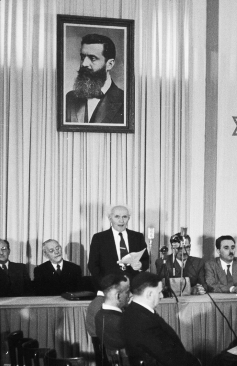Seventy Years to the UN Partition Plan for Palestine. What Happened and What Might Have Happened
By Yoav J. Tenembaum
Published on November 28, 2017

On the 29th of November 1947, the General Assembly of the United Nations endorsed a partition plan entailing the establishment of a Jewish state and an Arab state in what was then Mandatory Palestine.
The Arab leaders rejected the plan as they were opposed to the establishment of a Jewish state in any part of Mandatory Palestine. The Jewish leaders, notwithstanding their reservations, decided to accept it. As a result, a series of attacks by Palestinian Arabs against the Jewish population evolved into a major military confrontation between the two sides.
Following the declaration of independence by David Ben Gurion, who was to become the first Prime Minister of Israel, the surrounding Arab states joined the Palestinian Arabs in a war aimed at thwarting the establishment of the State of Israel.
The war ended in 1949, with heavy casualties on both sides. One percent of the Jewish population in Palestine in those years, i.e. around six thousand people, died during the war.
The Armistice Lines agreed upon by Israel and its Arab neighbours left the newly established Jewish state in control of a larger portion of territory than originally allotted to it by the UN partition plan, including the western part of Jerusalem, which would remain divided with Jordan until the end of the Six Day War in June 1967.
Few are the cases in history in which a counterfactual question can be answered, supposedly, so easily as in the case of the 1947 UN Partition Plan. What might have happened if the leadership of the Palestinian Arabs and the Arab States had accepted the UN Partition Plan?
Probably, there might have been no war, no bereavement, no refugees and thus no Nakba in 1947-1949. Perhaps, there might have been no Arab-Israeli wars in 1956, 1967, 1973…
How many lives might have been spared? How many wounded and disabled might have pursued a life without physical and emotional impediments?
Of course, one could imagine a scenario whereby the Arab side might have accepted the principle of partition, but not the particular map voted upon at the UN General Assembly.
Certainly, endorsing the principle of partition might have been pragmatically convenient for the Arab leadership in order to try to dilute the effects of the UN Partition Plan. Rather than thwart it militarily, they might have prevented its implementation diplomatically. They might have played for time by saying “Yes, but.”
An alternative scenario founded on a logical historical process might have led to the creation of two states without the bloodshed and suffering entailed in the events as they unfolded from 1947 onwards.
However, one should bear in mind that for that to have happened there should have been an Arab leadership with foresight that eschewed political triumphalism and diplomatic rigidity.
The Arab leadership then was sincerely opposed to the establishment of a Jewish state in any part of Mandatory Palestine, no matter how big or small that state might have been. In addition, there was a widely-held belief that numbers and weapons would win the day: the Palestinian Arabs, assisted by the conventional armies of the Arab States, were expected to eradicate the organized Jewish presence in Mandatory Palestine and with it dash any hope of a Jewish state.
Therefore, one must distinguish between a depiction of a coherent counterfactual reality and the historical feasibility for that reality to take place considering all the variables known to us to have existed then. It is difficult to imagine a scenario different to what actually took place simply because of the mindset of the Arab leadership then.
A counterfactual question is indeed helpful in this case. Thanks to it we can imagine what might have happened if the Arab leaders had accepted the UN Partition Plan. Thanks to it also, however, we can imagine how inconceivable that might have been considering the deep-seated attitudes prevailing then among those same Arab leaders.
The irony is that today most Arab leaders, including the internationally recognized leadership of the Palestinian Arabs, profess they would be willing to accept the creation of a Palestinian Arab state which would be smaller in size than the one entailed in the 1947 UN Partition Plan.
A lost opportunity in history rarely affords a second chance to those responsible for it; and when it does, it’s appeal may seem less glowing than the lost opportunity concerned.
Seventy years of warfare and bloodshed have produced a reality on the ground that Arab leaders in 1947 didn’t dare imagine: a strong Jewish state, technologically advanced, militarily powerful and economically prosperous, as a tacit ally of the pragmatic Sunni Arab world.
The Author

Yoav J. Tenembaum is a lecturer at the Diplomacy Studies Program, Tel Aviv University. He obtained his doctorate in Modern History from Oxford University and his Master’s degree in International Relations from Cambridge University. He read for his B.A. in History at Tel Aviv University.
His articles have been published in journals, magazines and newspapers in various countries. He has taught courses and seminars on International Conflicts, International Crises, International Organizations and Institutions and The Shaping of Foreign Policy and Decision-Making.
Article picture: Declaration of State of Israel 1948. Source: Wikipedia


